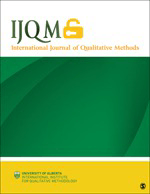
International Journal of Qualitative Methods
Scope & Guideline
Advancing qualitative insights for a transformative academic landscape.
Introduction
Aims and Scopes
- Innovative Qualitative Methodologies:
The journal prioritizes the publication of studies that introduce new qualitative methods or adapt existing methodologies to enhance research validity and reliability. - Interdisciplinary Approaches:
It encourages interdisciplinary research that integrates qualitative methods with other research paradigms to address complex social issues. - Community-Based Participatory Research:
The journal emphasizes research that involves community engagement and participatory approaches, ensuring that the voices of marginalized communities are heard and valued. - Ethical Considerations in Qualitative Research:
A strong focus on ethical practices in qualitative research, particularly when working with vulnerable populations, ensuring that ethical dilemmas are carefully navigated. - Reflexivity and Positionality:
Promoting reflexivity among researchers regarding their positionality, biases, and the impact of their identities on the research process and outcomes. - Arts-Based Research Approaches:
The integration of arts-based methods in qualitative research to enrich data collection and analysis, allowing for deeper exploration of participants' experiences.
Trending and Emerging
- Digital and Virtual Research Methods:
The use of digital tools and online platforms for conducting qualitative research has surged, especially following the COVID-19 pandemic, leading to innovative methods such as virtual focus groups and online interviews. - Intersectionality and Diversity:
A growing emphasis on intersectionality in qualitative research, exploring how overlapping social identities impact experiences and outcomes, particularly in marginalized communities. - Participatory and Collaborative Research:
There is an increasing focus on participatory and collaborative methodologies that actively involve participants in the research process, fostering co-creation of knowledge. - Health Equity and Social Justice:
Research addressing health disparities and social justice issues is trending, with qualitative studies aiming to understand and advocate for equitable health outcomes. - Arts-Based and Creative Methods:
The integration of arts-based approaches in qualitative research is becoming more prominent, allowing for rich, nuanced data collection and analysis that captures participants' lived experiences. - Methodological Innovations:
Emerging methodologies that challenge traditional paradigms, such as narrative inquiry, autoethnography, and visual ethnography, are gaining recognition for their unique contributions to qualitative research.
Declining or Waning
- Traditional Qualitative Methods:
There is a noticeable shift away from conventional qualitative methods such as basic interviews and focus groups, as researchers explore more innovative and participatory approaches. - Generalized Qualitative Frameworks:
The emphasis on broad qualitative frameworks without specific contextual application is diminishing, with a growing preference for context-specific methodologies. - Descriptive Qualitative Studies:
Studies that primarily focus on descriptive qualitative analysis without critical engagement or theoretical framing are becoming less common in favor of more analytical and reflexive approaches. - Single-Method Studies:
There is a trend towards mixed-methods approaches where qualitative research is increasingly combined with quantitative methods, leading to a decline in purely qualitative studies.
Similar Journals
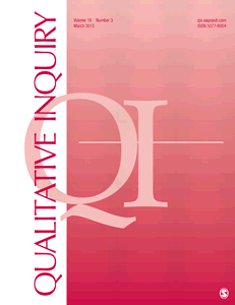
QUALITATIVE INQUIRY
Transforming Social Phenomena into Insightful KnowledgeQUALITATIVE INQUIRY is a leading academic journal published by SAGE Publications Inc, dedicated to advancing the field of qualitative research within the domains of Anthropology and Social Sciences. With an impressive Q1 ranking in both categories for 2023, the journal holds a prominent position in the academic community, recognized for its high-quality contributions and influential research. The journal, available in print with the ISSN 1077-8004 and electronically with the E-ISSN 1552-7565, showcases innovative methodologies and critical analyses that deepen our understanding of social phenomena. Researchers, professionals, and students will find a wealth of knowledge as the journal publishes insightful studies that push the boundaries of qualitative inquiry. Situated in the vibrant academic landscape of the United States and operating from its headquarters in Thousand Oaks, CA, QUALITATIVE INQUIRY plays a crucial role in shaping discussions and fostering new perspectives in the social sciences, underscoring its importance in the scholarly community.

Qualitative Psychology
Fostering a deeper understanding of the human psyche.Qualitative Psychology is a premier scholarly journal published by the American Psychological Association, dedicated to advancing the field of qualitative research within psychology. With an ISSN of 2326-3601 and an E-ISSN of 2326-3598, this journal has established itself as a vital resource for both researchers and practitioners since its inception in 2014. The journal focuses on illuminating the complexities of human experience through qualitative methodologies, contributing significantly to its category's impact factor as evidenced by its Q1 rank in Psychology (Miscellaneous) and placing it in the top 11% according to Scopus, where it ranks #24 out of 216. Although it is not an open access journal, Qualitative Psychology provides a platform for innovative and rigorous scholarship that fuels academic discourse and enhances understanding in diverse psychological contexts. Through its publication of high-quality, peer-reviewed articles, this journal plays an essential role in shaping contemporary qualitative inquiry and is an invaluable resource for students and professionals aiming to deepen their insights in the psychology landscape.
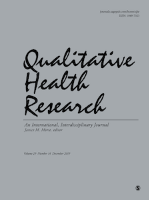
QUALITATIVE HEALTH RESEARCH
Navigating the Nuances of Health Through Qualitative InquiryQUALITATIVE HEALTH RESEARCH is a pivotal journal published by SAGE Publications Inc, specializing in the dynamic field of qualitative research within public health and health services. With an ISSN of 1049-7323 and an E-ISSN of 1552-7557, this esteemed publication has secured a prominent position in academic discourse, as evidenced by its Q1 ranking in the 2023 category of Public Health, Environmental and Occupational Health and a Scopus rank of #100 out of 665, placing it in the 85th percentile. Since its inception in 1991, the journal has fostered innovative methodologies and diverse perspectives, making it an essential resource for researchers, professionals, and students dedicated to understanding the complexity of health experiences and outcomes. Although it does not feature open access, QUALITATIVE HEALTH RESEARCH remains committed to advancing knowledge and scholarly dialogue, ensuring that significant contributions in qualitative methodologies are readily available to a global academic audience.
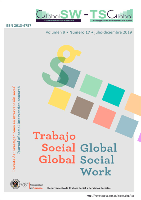
Trabajo Social Global-Global Social Work
Championing the future of social work on a global stage.Trabajo Social Global-Global Social Work is a premier open-access journal published by the University of Granada's Department of Social Work, dedicated to advancing the fields of social work and social welfare on a global scale. With its ISSN 2013-6757 and E-ISSN 2013-6757, this journal has been making significant contributions since its establishment in 2010, emphasizing the importance of accessible research for practitioners, scholars, and students alike. Situated in Granada, Spain, the journal provides a platform for innovative research, critical analyses, and contemporary discussions on global social work practices, policies, and theories. By encouraging collaboration and knowledge exchange among professionals from diverse backgrounds, Trabajo Social Global plays a vital role in shaping social work education and practice around the world. Researchers and practitioners are urged to submit their work to this influential journal, as it continues to foster a deeper understanding of the challenges and opportunities in the field of social work today.

Action Research
Empowering Change Through Collaborative ResearchAction Research is a distinguished academic journal that delves into the dynamic intersection of practice and theory within the realms of organizational behavior, sociology, and management. Published by SAGE Publications Ltd, this esteemed journal provides a platform for innovative research that seeks to address complex social issues through a collaborative and participatory lens. With its impact factor reflected in its robust rankings—Q2 in Organizational Behavior and Human Resource Management and Q1 in Sociology and Political Science (2023)—the journal is a critical resource for scholars and practitioners alike, fostering cross-disciplinary dialogues that enhance both theoretical understanding and practical application. Operating from the United Kingdom, the journal has embraced a considerable historical scope from 2003 to 2024, positioning itself at the forefront of contemporary research challenges. By ensuring accessibility to leading studies in Social Sciences, this journal not only enriches the academic community but also empowers professionals and students striving for excellence in their respective fields.
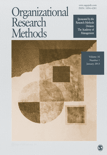
ORGANIZATIONAL RESEARCH METHODS
Empowering Innovation Through Rigorous Research.ORGANIZATIONAL RESEARCH METHODS is a premier academic journal published by SAGE Publications Inc, dedicated to advancing the field of organizational research through innovative methodologies and rigorous empirical studies. With an ISSN of 1094-4281 and an E-ISSN of 1552-7425, this journal has made significant contributions to the disciplines of decision sciences, management of technology and innovation, and strategy and management, holding prestigious Q1 rankings in each category for 2023. The journal's emphasis on methodological rigor and theory development makes it an essential resource for researchers, practitioners, and students alike, facilitating insights that drive effective organizational practices. With a strong impact in the academic community, as evidenced by Scopus rankings placing it in the top percentiles for its related fields, ORGANIZATIONAL RESEARCH METHODS serves as a critical platform for disseminating cutting-edge research from 1998 through 2024, empowering thought leaders to shape the future of organizational studies.

Qualitative Report
Empowering Researchers with Impactful Qualitative FindingsThe Qualitative Report, published by NOVA Southeastern University, is a leading open-access journal dedicated to the rich field of qualitative research. Since its inception in 1990, the journal has emerged as an essential resource for researchers, practitioners, and students interested in cultural studies, education, and social psychology. With a notable impact factor reflected in its 2023 quartile rankings—Q1 in Cultural Studies, Q2 in Education, and Q3 in Social Psychology—the journal showcases cutting-edge research and diverse methodologies that advance understanding within these areas. Its Scopus rankings further underscore its influence, positioning it within the top 10th percentile in Cultural Studies and among the top tiers in Education and Social Psychology. The Qualitative Report is based in the United States and provides an innovative platform for disseminating impactful qualitative studies, reinforcing its commitment to fostering dialogue and promoting visibility in the academic community.
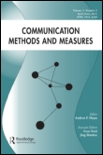
Communication Methods and Measures
Elevating scholarly discourse in communication dynamics.Communication Methods and Measures is a leading journal published by Routledge Journals, Taylor & Francis Ltd, specializing in the field of communication. Since its inception in 2010, the journal has established itself as an influential voice in advancing the methodologies and measurement practices utilized within communication research. With an impressive Q1 ranking in the Communication category as of 2023, it plays a pivotal role in disseminating cutting-edge scholarship that bridges theory and practical application. Although it is not an Open Access journal, it provides a wealth of valuable insights, making it an essential resource for researchers, professionals, and students alike. The journal’s focus on innovative methods and rigorous measurement approaches fosters a deeper understanding of communication dynamics, contributing significantly to the growing field of study. Located in the United States and accessible globally, Communication Methods and Measures continues to serve as a fundamental platform for scholarly discourse and exploration in communication research.

Departures in Critical Qualitative Research
Challenging Boundaries in Communication and Language StudiesDepartures in Critical Qualitative Research, published by University of California Press, is an influential journal dedicated to advancing knowledge within the realms of Communication and Linguistics and Language. With its commitment to exploring the complexities and nuances of qualitative research, this journal has quickly established itself as a vital resource for scholars and professionals alike. Although it currently resides in the fourth quartile in Communication and the third quartile in Linguistics, its notable Scopus rankings, including a 64th percentile in Language and Linguistics, highlight its growing significance in the academic discourse. Covering a converged period from 2019 until 2024, the journal seeks to foster innovative and critical perspectives on qualitative methodologies, offering invaluable insights that address contemporary social issues. Access to its content is available to a wide audience, contributing to the journal's reputation as a beacon for those engaged in critical qualitative research.
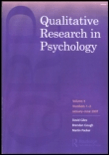
Qualitative Research in Psychology
Innovating the dialogue in qualitative psychological research.Qualitative Research in Psychology is a premier journal dedicated to advancing the field of qualitative research within psychology. Published by Routledge Journals, Taylor & Francis Ltd, this influential journal has established itself as a pivotal resource since its inception in 2004 and is set to continue its impactful journey through 2024. With an impressive Q1 ranking in the miscellaneous psychology category, it ranks #6 out of 216 in general psychology according to Scopus, placing it within the top 3% of its field. The journal's commitment to promoting qualitative methodologies makes it an essential platform for researchers, professionals, and students aiming to explore the complexities of human behavior and mental processes. Though it currently does not offer open access options, the journal provides critical insights and rigorous scholarly discussions that enrich the academic community's understanding of qualitative approaches. As a vital contributor to the psychological sciences, Qualitative Research in Psychology encourages interdisciplinary dialogue, ensuring that diverse voices and perspectives are included in the ongoing research discourse.